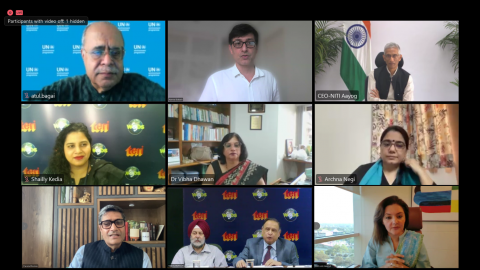LiFE aims to be the India-led, global jan andolan, says NITI Aayog CEO

New Delhi, October 12, 2022: Noting that India is the first country to include Lifestyle for the Environment – LiFE in its Nationally Determined Contributions, Mr Parameswaran Iyer, CEO, NITI Aayog, said during the National Conference on COP27 Compass in New Delhi on Wednesday that the movement aims to bring individual behaviours to the centre of climate action.
Delivering the Leadership Address on ‘Lifestyle for the Environment – LiFE’ at the conference pivoted on the theme ‘Road to Sharm el-Sheikh: Towards Equitable and Collection Climate Action’, Mr Iyer stressed that LiFE, while nudging Sustainable Development Goals such as responsible production and consumption, envisions to be the “India-led, global jan andolan to trigger simple actions that everyone across the world can take to protect the environment.” Underscoring the bid to internationalize LiFE, he said it will also be a significant component at the upcoming G20 Presidency of India.
The national conference brought together policymakers, climate scientists and researchers under the COP27 Compass component of TERI’s Act4Earth Initiative as they underscored the need to raise ambitions at both the national and global levels to address climate change issues ahead of the upcoming COP27 in Egypt in November.
Dr Vibha Dhawan, Director General of TERI, said, “The COP27 Compass seeks to bring forward issues pertaining to the Global South which are also of utmost importance with respect to the upcoming UNFCCC COP27.”
Noting that COP27 will bring together countries, companies, civil society, and citizens on a common platform to work towards a more sustainable future through adaptation, mitigation, finance, and collaboration, Dr Dhawan added, “The principles of equity, ‘polluters pay’, Common But Differentiated Responsibilities and Respective Capabilities (CBDR-RC) outlined in the UNFCCC must be cornerstones of success outcomes of COP27.”
Observing that COP27 will convene at a difficult juncture with many developed countries stepping back on their pledge to move towards cleaner sources of energy, Mr Chandrashekhar Dasgupta, Former Ambassador and Distinguished Fellow Emeritus, TERI, said the new development adds to the already huge burden on poor countries with respect to adaptation, and therefore, highlights the need for stepping up financial support. “It also highlights the importance of proceeding with our work solidly on the principle of equity. The principle of CBDR-RC should be the cornerstone of our work at Sharm el-Sheikh,” Mr Dasgupta added.
Highlighting that the issue of finance is the most contentious one on the table, Mr Atul Bagai, Country Director - India, United Nations Environment Programme, said, “From the CBDR-RC perspective, there needs to be a transparent and soul-searching conversation with the developed countries on how they will fulfil the responsibilities they have, the financial one definitely being the main area of work.”
Dr Navroz K Dubash, Senior Fellow, Centre for Policy Research, noted that COP27 was set to open in a world fraught with challenges driven by the Ukraine-Russia situation and the energy security crisis in Europe. “It is being pitched as the loss and damage COP. Pakistan had recently suffered a climate catastrophe…There is a scope for India to play a role in bringing South Asia together as a cogent voice backing Pakistan on the loss and damage issue,” said Dr Dubash. He also underscored that India is justifiably concerned about the finance agenda, both on the mitigation side as well as on the adaptation, and loss and damage side. “But we have to come up with much more concrete suggestions on what we want to see on the table,” he added.
Though the upcoming COP27 is set in Africa, there is a need for it to be the developed countries’ COP as well, pointed out Mr Chandra Bhushan, Chief Executive Officer, International Forum for Environment, Sustainability & Technology. “It needs to be one where we (developing countries) put the agenda for the developed countries to respond, whether with respect to fossil fuel subsidy, or their reluctance to deal with the massive transitions required in the developed world.” Transparency, he noted, is necessary from developed countries as well on how they aim to bring about systemic and large-scale transitions. LiFE, Mr Bhushan observed, should be nuanced to address the different issues of the developed and the developing world.
Addressing the issue of equity, Dr Archna Negi, Associate Professor, Jawaharlal Nehru University, said, “The Pakistan (floods) case is an important one that flags the equity question because you have a country that is responsible for less than 1% of global GHG emissions finding itself on the eighth rank in the list of countries that are more vulnerable to extreme weather events. It is the equity question the Global South should take not only to COP27, but subsequent COPs as well.”
Ms Kashmala Kakakhel, Climate Finance Specialist & Former Member, Executive Committee, Green Climate Fund, said, “This is a crucial COP from the climate finance perspective and the developing countries should keep pushing for the needs of the countries. The starting point is not the USD 100 billion, but the needs of the developing countries.” Ms Kakakhel underscored the importance of having a proper accounting methodology in place for climate finance.
The key takeaways from the COP27 Compass and SDG Charter policy briefs produced by TERI were shared by Dr Shailly Kedia, Senior Fellow, TERI. Touching upon the discussions, Mr Manjeev Puri, Former Ambassador and Distinguished Fellow, TERI, said, “Climate change is perhaps the most important global strategic conversation…even within South Asia it is important for us to realise that it is easier to speak as a cogency of voices.”
About TERI
The Energy and Resources Institute (TERI) is an independent, multi-dimensional research organization with capabilities in policy research, technology development, and implementation. Headquartered in New Delhi, TERI has regional centres and campuses in Gurugram, Bengaluru, Guwahati, Mumbai, Panaji, and Nainital, supported by a multi-disciplinary team of scientists, sociologists, economists, engineers, administrative professionals, and state-of-the-art infrastructure.
